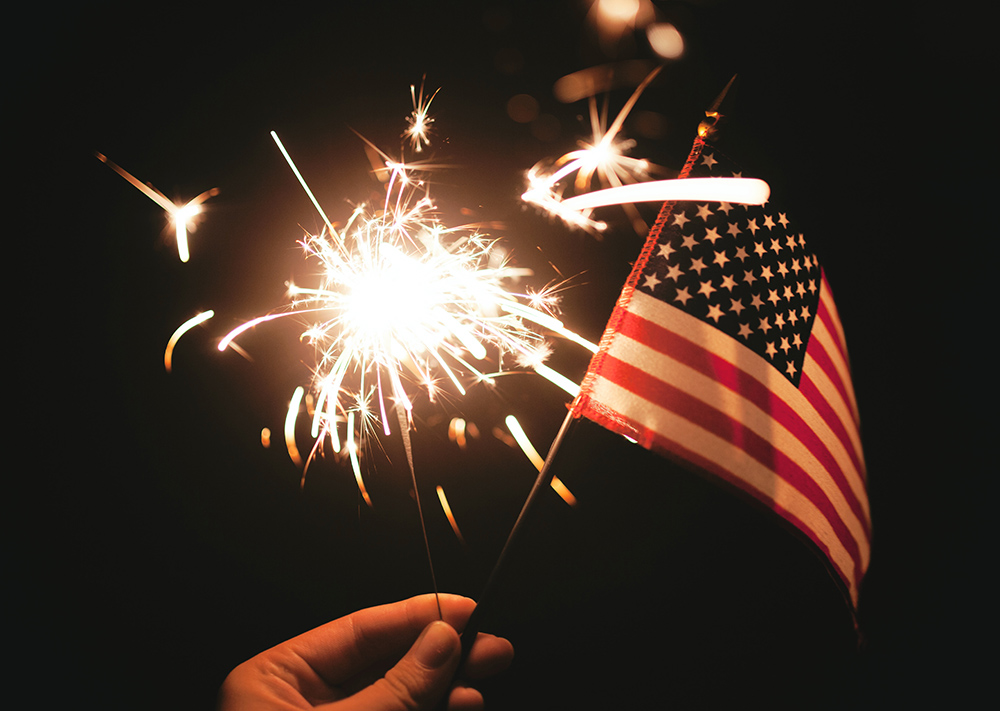
(Unsplash/Stephanie McCabe)
On July 2, 1776, the members of the Continental Congress of the Thirteen Colonies voted to declare their independence from Great Britain and to declare the formation of a new nation, to be known as the United States of America. A committee set to work to justify this radical act, and two days later, on July 4, a document known as the Declaration of Independence, written primarily by Thomas Jefferson, was issued and signed by representatives from each colony, now independent states.
For the past 247 years, that date has been known in this country as our Independence Day.
We know many of the most famous statements that Jefferson made in that document. "We hold these truths to be self-evident, that all men are created equal, that they are endowed by their Creator with certain unalienable Rights, that among these are Life, Liberty and the pursuit of Happiness." That statement represents the core idea of what we call the American dream, the promise that our nation holds, or should hold; the task that it has to live up to.
It is a promise that has gone unfulfilled.
For that reason, some view this day with more cynicism than they did in the past. I have mixed feelings about celebrating this secular observance in our churches, as the bishops have asked us to do liturgically. The promise of America was unfulfilled by the founders.
Our national project of freedom is work left undone. It was put in place by flawed people, and it continues to be carried out by flawed people. But we have trust in the hope of that promise.
Jefferson, the apostle of American liberty, who wrote so eloquently of freedom, owned hundreds of Black slaves, at least one of whom would bear his children. Alexander Hamilton, the architect of our financial system who fought in the Revolution so that America could have freedom and peace, was killed in a duel over personal honor, shot by the sitting vice president, Aaron Burr. Even George Washington, the father of our country, was disillusioned by the bitterness and division that witnessed in the new nation after he finally laid down his sword.
I read the words of Jefferson in our Catholic parish today. This is the same man that also wrote, "History, I believe, furnishes no example of a priest-ridden people maintaining a free civil government," and "In every country, in every age, the priest has been hostile to liberty."
Only one signer of the declaration was Catholic (Charles Carroll of Maryland), and for much of our history, Catholics were subject to discrimination on the basis of their religion, a situation that many of our Muslim brothers and sisters face in contemporary times.
So, why July Fourth? What do we have to celebrate on this day?
We celebrate the promise, the potential, the capacity for growth, development and change that is within our power to bring to fulfillment. Our national project of freedom is work left undone. It was put in place by flawed people, and it continues to be carried out by flawed people. But we have trust in the hope of that promise.
Advertisement
The same is true of our faith — and our church. Time and again, we could look to see how leadership has failed us, how corruption infects us, how despair threatens to overtake us, but we learn from the past and we proceed to a future of our own making, guided by God.
We have hope that the promises of our faith will come to fulfillment. We are not there, far from it. But we work toward that goal.
The prophet Amos tells us to seek good and not evil, to hate evil and love good. We need to hate the evil we see in our nation and in our church and fight against it, wherever it shows itself: the poverty in our cities and towns, the separated families at the border, a system that prizes wealth and power over the needs of the most vulnerable among us — a system where who you are, where you come from and what your racial and ethnic background are are still obstacles to taking full part in the promises of the nation.
These are not only wrong in a civic sense, they are sinful in a Christian sense.
We celebrate the opportunity and the capacity to ask more of ourselves, of our fellow-citizens, of our state, of our country, of our leaders. This is our common project.
Amos records the Lord stating that God hates our feasts, takes no pleasure in our solemnities, tells us "away with our noisy songs." God does not want us to celebrate in the midst of suffering and sin, but wants us to offer up to God justice surging like water, and goodness like an unfailing stream, words later used to great effect by the Rev. Martin Luther King Jr., in the struggle for the full freedom and participation of his own people in our American project. Celebration without justice is not pleasing to God.
And yet it is appropriate to celebrate on this Fourth of July if we are committed to the mandate of creating a more just world. We celebrate the promise that America still has potential to bring to completion. We celebrate the opportunity and the capacity to ask more of ourselves, of our fellow-citizens, of our state, of our country, of our leaders. This is our common project.
We celebrate the fact that the last chapter of this nation is not engraved in stone. It will continue to be written, it will continue to flourish and advance and improve, so long as We the People have the will to make our voices and actions heard, known and recognized, as long as we citizens understand that we can, should and must work to make things better.
The project is never done, and we will not live to see its full completion. But nevertheless we proceed in the sure and unswerving hope that justice and goodness and God always spur us on. Happy Fourth of July.







